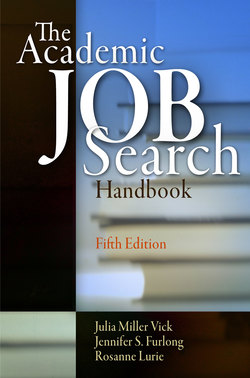Читать книгу The Academic Job Search Handbook - Jennifer S. Furlong - Страница 16
На сайте Литреса книга снята с продажи.
ОглавлениеChapter 7
Learning About Openings
Once you have decided what kinds of jobs to pursue, there are several resources you can use to ensure that you learn about all the opportunities that might interest you.
Scholarly Associations
Every discipline has a scholarly association that serves its members in many ways. Scholarly associations sometimes provide well-developed online resources on careers and job-related services. In addition, most scholarly associations regularly publish a listing of postdoctoral and tenure-track academic job openings. When an academic department has an opening, it is customary to advertise the position in an association jobs database.
In many cases, the job listings are available to members only. However, most associations offer membership to students at a reduced rate. Sometimes it is possible to subscribe to the job listings separately. Your department probably receives job listings from the corresponding association and possibly listings from related associations as well. Find out which job opening publications your department subscribes to, and how to access them. Better still, get your own subscription. When there are active listservs or discussion forums in a field, jobs are often posted to them as well.
As some scholarly associations provide structured programs at their annual conferences that can range from making interview rooms available to running formalized interviewing operations for search committees and candidates, check with your association to see whether such a program exists. Some individual institutions also set up interviews in their rooms or suites during conferences. (See Chapter 14, “Preliminary Interviews.”)
If you do not know which association is appropriate for your field, ask your advisor and other faculty members in your department, use a search engine, or check other resources including Appendix 1 of this handbook for selected listings.
Career Advice and Resources
Some associations do have reasonably sophisticated job hunting websites for their members that can range from a single page of interviewing techniques to a well-developed section focused on “Careers in …” to a published book covering all aspects of the job search in that field. Such guides often cover non-faculty careers as well as academic employment.
National and Local Publications
The Chronicle of Higher Education is a national news resource of higher education. Vitae, The Chronicle’s career hub, lists faculty openings at all types of institutions across the United States as well as some international ones. Its job listings are searchable at no cost to readers. Equally strong resources for job listings are Inside Higher Education and HERC, the Higher Education Recruitment Consortium.
The bimonthly Diverse Issues in Higher Education is a newsmagazine dedicated exclusively to minority issues in higher education. It has an extensive job listing section in both the print and the online editions.
Job seekers looking for community college positions can find announcements in the American Association of Community Colleges job bank. Listings of postdoctoral opportunities can be found in postdocjobs.com and Science Careers. (See Appendix 1 for additional information and URLs for these resources.)
Institutional Websites
Institutions have human resource websites where faculty openings are posted. A quick way to find employment menus of college and university websites is to use a resource such as www.academic360.com, which has links to international institutions and community colleges as well.
Sometimes position announcements are posted on departmental websites. When this occurs, it is usually the case that the position has simultaneously been posted elsewhere, such as in a jobs database of the relevant professional association.
Job Search Wikis and Social Media
As most readers know, a wiki is a website that can be edited by anyone on the Internet. In the past several years, wikis about the status of academic positions have become a significant part of candidates’ job searches. Typically these wikis allow a user to share insider information such as whether a school has posted a position, conducted interviews, or already extended an offer to fill an open position. It is important for candidates to use their judgment in both reading wikis and posting to them, as the information contained therein is not always reliable. Nonetheless it can be valuable for candidates to monitor these forums without becoming obsessed by them. (Please refer to Appendix 2 for links to selected wikis.)
With increasing frequency positions across industries are being announced on social media. While this isn’t as prevalent in academia, sometimes faculty openings are posted on LinkedIn, Twitter, and other sites. If you are using social media as part of your professional profile, learn which institutions, individuals, or associations to follow.
Your Network
Faculty in your department receive announcements from colleagues at other schools where there are openings. Keep a high profile in your department so that they will think of you when they hear about jobs. Know how your department circulates job openings and pay attention to them.
For temporary non-tenure track jobs you may make direct inquiries of departments that interest you. This approach works best when you can give department chairs a rationale for your call or email message, such as an interest in a particular kind of school or in schools in a clearly defined geographic area.
Occasionally you will know the person running the search, or someone in the department who may be on the search committee. Let them know you are applying. And keep in touch with everyone you know who might hear about openings: for example, former fellow graduate students or former fellow postdocs who have already found jobs, former professors at other institutions, and people you have met at conferences. Let them know when you are beginning your job search and nearing the end of your dissertation or postdoctoral research. Be sure to thank anyone who notifies you of a job opening, even if it doesn’t work out or is not a good fit for you.
